
Monks of Mellonwah Neurogenesis (Gatcombe Music)
There are two definitions of "progressive" with respect to music. One is the progression of a band: how it develops over time, finding itself, setting its style (assuming it finds one), channeling its influences, etc.
The other is a genre of rock music, one which I have defined as "a mindset, a conscious and deliberate approach to writing rock music based on certain elements, which usually include some or all of the following: incorporation of Western (classical, jazz et al), Eastern (Indian, Middle Eastern, et al.) and/or 'world music' (African, Latin, et al.) influences; use of non-standard (for rock) chord progressions; use of odd and/or shifting time signatures; use of non-standard (for rock) instrumentation (from sax, flute, or violin to sitar, bagpipes, or African percussion); an 'orchestral' (i.e., scored) approach to arrangement; extended compositions, often including extended instrumental passages; virtuoso musicianship, often including extended solos; lyrics that tend toward the esoteric or fantastical and/or include numerous literary references; and the use of keyboards (Mellotron, synthesizers, etc.) and the recording studio itself to create effects, textures, and atmospheres."
Monks of Mellonwah may or may not fall under the latter definition (more on this in a moment), but I have rarely come across a band that has been more internally progressive in a shorter period of time. And that progression has been nothing short of extraordinary.
A quartet from Sydney, Australia, the Monks formed just a little over three years ago. Their first EP, Stars Are Out, offered five tracks with a straight-ahead rock sound featuring an assortment of rhythmic influences. The best cut, "Stampede," has a funky Led Zep/Red Hot Chili Peppers feel. It's a good EP, but the band is clearly "playing the field," looking for a direction.
They found it on their second EP, Neurogenesis, by changing lead singers and laying claim to a harder, more driving sound: less rhythmically experimental, but far more musical, mature, and "progressive."
The first track, "You Shine," opens with a U2-ish guitar-based drone, adds vocals, and moves into a driving, hard-edged sound that brings to mind some songs by Doves (and, to a lesser degree, The Church, both of which are favorites of mine). Another major change is clear as well: the band is now using "atmospheres" to round out their sound. And it serves them well.
The second track, "Neverending Spirit" (the single from the EP) brings the vocals front and center over an equally atmospheric arrangement. Not only did the song make many indie charts (as well as rotation on MTV), it also features a video that is compelling in its simplicity: the band plays the song "live" on a stage, with a series of video images shown on a screen behind them. What is evident from the video is that the Monks are a very tight, well-meshed unit -- tighter than one might expect after only three years and two EPs.
The title track is the most sonically inventive of the EP, with lots of layering of guitars, effects and percussives. It propels itself forward with increasingly driving force, ending with a raucous guitar solo.
The final track, "Kyoto," is a brilliant homage to the type of arrangements many Japanese hard rock groups actually use. (I can attest to this, having hung out with a number of Japanese rock bands in NYC.) With heavy (!) metal chords and choppy sound, it is nearly relentless in its forward movement.
As noted, the songwriting here is more mature, and has a stylistic solidity that was missing from the first EP. And although they claim influences such as Zep, Floyd, and Muse, that may (or may not) have been applicable to the first EP, but it is definitely not to the second. Rather, the influences I hear now are U2, Doves, The Church and (increasingly) Porcupine Tree (another favorite of mine). And they channel their influences beautifully.
Okay. So we could leave the Monks here, and be satisfied that they are undergoing a remarkable internal progression, one that has already given them increasing confidence in their songwriting and presentation. However, they thankfully do not seem to know how to leave well enough alone.
The Monks have just released a new song, an eight-minute multi-part composition that takes them to a new level entirely: "Sky and the Dark Night" takes the Monks into true "progressive rock" territory. Part I is an orchestral figure reminiscent of Yes and other classic "symphonic prog" groups. In Part II, the band joins the orchestra, and adds an eerily compelling vocal. We also get a neat guitar solo. Part III brings interplay between the band and the string section, and ends with a rhythm and guitar figure that would not be out of place in some of King Crimson's post-Court work. Despite having mentioned Yes and Crimson, the strongest influence here is definitely Porcupine Tree. And once again, the band channels its influences wonderfully. As an aside, if this is the direction the band is going, it will be "progressive" in both senses of the term.
Even if Monks of Mellonwah do not follow the path to "progressive rock," their progression from Stars Are Out to Sky and The Dark Night -- just three years, two EPs, and one song in distance -- is exceptional. In any case, I have become a serious fan, and very much look forward to their debut album this year -- and whatever surprises they may have for us in the future.
